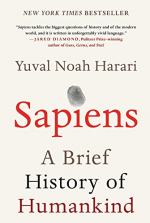
|
| Name: _________________________ | Period: ___________________ |
This test consists of 5 multiple choice questions, 5 short answer questions, and 10 short essay questions.
Multiple Choice Questions
1. Harari asserts that observation is not what?
(a) Incontrovertible proof.
(b) Certainty.
(c) Knowledge.
(d) Religion.
2. The Oceanic World comprised which parts of earth in 1450 AD?
(a) Most of western South America.
(b) Most of the islands of the south-western Pacific Ocean.
(c) The continent of Australia.
(d) Most of Central America and parts of North America.
3. To what author does Harari allude when stating the author's depiction of "the liberal regimes of nineteenth-century Europe" giving "priority to individual freedom" (165)?
(a) Albert Camus.
(b) Charles Dickens.
(c) The Marquis de Sade.
(d) Leo Tolstoy.
4. What is hubris?
(a) An unreasonable and blasphemous show of confidence.
(b) Humor.
(c) A system of agricultural processes.
(d) Human ingenuity.
5. Biological poverty is defined by Harari as what?
(a) A state that occurs when a person has been kept in quarantined conditions for too long.
(b) A state that endanger's a person's life due to a lack of food and shelter.
(c) A state that withholds from a person opportunities that are available to others.
(d) A state that occurs when a person experiences a sudden loss of health.
Short Answer Questions
1. Harari states that "the most remarkable and defining moment of the past 500 years came in" (249) what year?
2. The main argument present within the work entitled The New Instrument is that knowledge is what?
3. In what year did Magellan circumnavigate the earth for the first time?
4. Who was the author of the scientific manifesto entitled The New Instrument?
5. Harari states that the leading project of what revolution is to give humankind eternal life?
Short Essay Questions
1. How does Harari define the term "culturism" (303)?
2. What is Harari's view of how the Cook expedition marked a turning point within European history?
3. What evidence does Harari provide for his assertion that "the practices of empire-builders were entangled with those of scientists"? (296)
4. What does Harari say is the key to understanding a particular culture?
5. When Harari claims that "credit was not invented in modern Europe" (315), what does he say about its origin instead?
6. What connections does Harari draw among capitalism, modern science, and the emergence of European imperialism?
7. After Harari describes the rise of Europe as a locus of power in the world, what caveat does he make?
8. What distinction does Harari make between biological poverty and social poverty?
9. What evidence does Harari use to demonstrate the profound effect that empires and their belief systems have had on history, even among those cultures that consider themselves anti-imperialist?
10. How does Yuval Noah Harari define culture and what does he assert about its mutability?
|
This section contains 1,095 words (approx. 4 pages at 300 words per page) |

|




